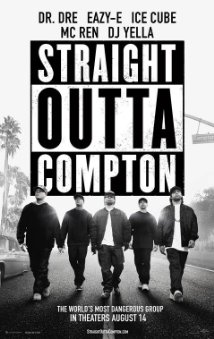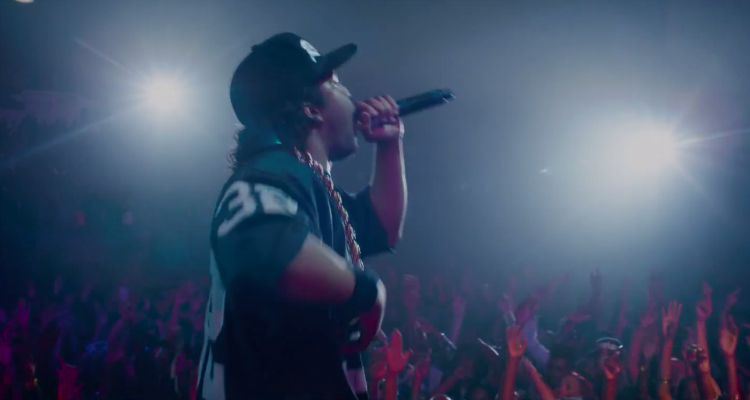You Are About To Witness The Strength Of Street Knowledge
 Erik Yates: “You are about to witness the strength of street knowledge”
Erik Yates: “You are about to witness the strength of street knowledge”
With this opening line, N.W.A. burst onto the national scene with their real-life version of rap that “told the truth” about what they saw when they went out their front door. Their experiences originated in Compton, a neighborhood from South Central Los Angeles, but soon became a soundtrack for the contemptuous relationship people of color had with the people that were supposed to “serve and protect”. Their music, and the solo careers of N.W.A.’s members (Eazy-E, Ice Cube, Dr. Dre, DJ Yella, and MC Ren), were the soundtrack of those times including the famous Rodney King beating caught on video and the “not-guilty” verdict that sparked the Los Angeles riots. At the center of it all was the anthem “F*** the Police” giving voice to the frustrations of many who either identified with the sentiment of the song, or who felt that the song was advocating and causing increased violence and distrust towards the law enforcement community.
The film Straight Outta Compton begins in 1986, leading into 1989 when N.W.A. released their EP, followed by their first full-length album “Straight outta Compton”. The film, which takes its name from this track, follows the band through their successes and struggles, but keeps their connection to the culture fully intact, even when the band is not. But people going to celebrate this iconic band through viewing this bio-pic should not just expect to see a history lesson. For while this story is located in a very specific time, the things that N.W.A. was singing about has re-entered our national discourse once again.
From the incidents in Ferguson, Missouri to Baltimore, Maryland, and what has become almost daily appearances on the nightly news, the violence and distrust between many minorities and the police at large, has once again erupted and spilled out onto the streets.
#BlackLivesMatter and other such movements continue to rally the public to take notice of the same kind of world N.W.A. was singing about 26 years ago. And if you are going to understand their anger, frustration, and impact on the culture, then you’re going to have to know their story, and how their art shaped the culture then…. and today.

Jim Tudor: Exactly. Although Straight Outta Compton is one of the most deftly made films this year, the notion of why this story is being told now is a very valid one. Arriving one week long of the single year anniversary of the death of Michael Brown in Ferguson (located about 30 minutes from my home), this film, with its raging tensions between long-oppressed African-Americans and fed-up ever-roving police, could be viewed as both exploitative and apt in its timing. I’m happy to say that it’s far more a case of the latter. As year-old wounds are re-examined amid protest, civil disobedience, and media focus, Straight Outta Compton takes us back to that time in L.A. when things were not so dissimilar.
 A period piece spanning from 1986 to about 1994, the film, as directed by F. Gary Gray, is both taut and epic, a two and half hour gangsta rap epic that is every bit as intimate as it is vast. It is the rare ensemble film that spreads the narrative accordingly and equally, sowing sympathy and humanity for all the main characters, even as they, at times, take sides against one another. It’s a lean but fully satisfying piece of filmmaking with no fat on its bones, whatsoever. Boasting numerous members of N.W.A. as producers, it is without question the version of the story that the group wants told. But, as a musician biopic – one of the toughest niches in all of cinema to spin as fresh – this one achieves the rare feat of putting forth a certain immediacy. Astonishingly, it takes the violent and imposing world of early gangsta rap, something so intimidatingly foreign and other to those outside of its worldview, and presents it in a universal and approachable way. And it does so at a historically volatile time so sadly reminiscent of the scene it depicts. The filmmakers may’ve had to redress the recording studio locations to analog, resurrect Tower Records, and scrub the landscape of URLs, but they didn’t have to look far to tap into the uneasy social pulse the film’s characters build their careers upon.
A period piece spanning from 1986 to about 1994, the film, as directed by F. Gary Gray, is both taut and epic, a two and half hour gangsta rap epic that is every bit as intimate as it is vast. It is the rare ensemble film that spreads the narrative accordingly and equally, sowing sympathy and humanity for all the main characters, even as they, at times, take sides against one another. It’s a lean but fully satisfying piece of filmmaking with no fat on its bones, whatsoever. Boasting numerous members of N.W.A. as producers, it is without question the version of the story that the group wants told. But, as a musician biopic – one of the toughest niches in all of cinema to spin as fresh – this one achieves the rare feat of putting forth a certain immediacy. Astonishingly, it takes the violent and imposing world of early gangsta rap, something so intimidatingly foreign and other to those outside of its worldview, and presents it in a universal and approachable way. And it does so at a historically volatile time so sadly reminiscent of the scene it depicts. The filmmakers may’ve had to redress the recording studio locations to analog, resurrect Tower Records, and scrub the landscape of URLs, but they didn’t have to look far to tap into the uneasy social pulse the film’s characters build their careers upon.
Focusing on the relationship of key group mates Dr. Dre (Corey Hawkins), Eazy-E (Jason Mitchell), and Ice Cube (O’Shea Jackson, Jr., the real-life son of Ice Cube), Straight Outta Compton dramatizes their rags to riches in a manner that bursts at the seams with vitality and earnestness. Like the story it portrays, it is a bustling endeavor full of spark and verve that will not be denied. While the occasional depictions of debauchery and especially the street language push the limits of the film’s R rating, they certainly do not ring as inauthentic. If anything, the scenes of the infamous “wet and wild” parties and hotel room escapades are toned down versions of whatever really went down, and the language is nothing short of essential to depicting the tenor of their work, and the world at hand.

Erik Yates: Paul Giamatti adds to the new sub-genre he has created for himself in 2015 of playing marginal people handling the careers of big-time artists. In Love & Mercy, he of course was Dr. Eugene Landy who handled Brian Wilson (The Beach Boys) career in the 1980’s, and here he plays Jerry Heller, who partners with Eazy-E to found Ruthless, N.W.A.’s label. Heller is not as easy to categorize as Landy in terms of their questionable practices. Heller was never sued by any artist he represented, a fact made clear in the film, going back to the 1960’s and into the modern day, but is clearly depicted by the members of N.W.A. and Eazy-E’s widow, who all produced the film, as clearly being shady. Giamatti plays a wonderful antagonist, especially to Ice Cube who sees through the hype and industry speak. Ice Cube, along with Dr. Dre, continue to this day to be very astute businessmen with Dr. Dre inking a billion dollar deal with Apple to own Dre’s “Beats” brand. But the origin of all we know lies within these 8 years contained in the film.
I think that you are right to mention that this film makes gangsta-rap both universal and approachable where it might not be the case if left to only the music. The fact is that these artists had something real to say that can be understood at every level, even when it is couched in terminology, beats, and style that may only appeal to smaller segments of the overall population. In opening up this world, it not only validates this form of rap as an art form, but it identifies for the younger generation the importance of having something to say beyond the typical message of pop that has been more on the superficial (this goes back to the 1950’s with pop music being labeled “bubble gum” music….not much has changed).
People listening to today’s hip-hop and rap music should really understand the roots of the genre, and while N.W.A. are not the godfather’s of the style like Curtis Blow, Grandmaster Flash, or the Sugar Hill Gang may be, they are early pioneers of the modern medium. For those not familiar with N.W.A. or gangsta-rap, this may be a film that draws a parallel to Johnny Cash’s Walk the Line for country, or even the film Ray, for early R&B. Watching the film depict Ice Cube’s subsequent solo career dovetailing with N.W.A.’s attempt to continue their success without him provided a lot of context for the lyrics of classic Ice Cube songs like “No Vasoline”. It was also interesting to see the hand that member’s of N.W.A. had in being caught up with the likes of Suge Knight, Death Row Records, Snoop Dogg, Tupac Shakur, and eventually Eminem and beyond.

Jim Tudor: For me, all of those names were familiar to varying degrees, but I was unaware of such early career connectivity. Erik, as you and I both attended the same primarily white, suburban high school right at the apex of this story, I’ll share that my own recollection of this scene was one of percieved danger, very much observed from a distance. If anything, I recall more fascination and/or outrage among fellow students leaning towards 2 Live Crew and their run-ins with Tipper Gore’s emerging efforts to label CDs for obscenity than N.W.A. With guns, threats, bragadicio, and imposing beats, the music of N.W.A. and their contemporaries prompted me to run the other direction rather than attempt to understand.
Granted, this musical style never had much allure for me in the first place, and the frustration against police was a foreign notion. No, the police don’t get anything resembling “equal time” in this story. But that’s another side of the story for a different film. On multiple occasions in the movie, they do indeed simply appear randomly and start harrassing black people for no reason. But by now we know that this was – and is – an unfortunate shared experience for many…
For those willing to engage the R-rated content, this film is a mainstream-friendly bridge to understanding this world out of Compton, a bridge that simply wasn’t there before.
It shows how the bootstrap-pulling notion of “transcending one’s roots” might not always be possible, but for some, the past propels. Regardless of one’s tastes in music, it’s superior to both Ray and Walk the Line for the careful line it walks, successful as a social portrait and a true ensemble (where even Giamatti’s Jerry Heller is a sympathetic character – more than can be said for his cartoonish weasel-like agent in Rock of Ages). The performances by the mostly inexperienced lead actors carry the film collectively. For F. Gary Gray, who years ago directed Ice Cube in the comedy smash Friday (which, in a fun little meta turn, the Cube character is seen developing at one point), this is his masterpiece. In a right and just awards season, Oscar bling should be in the close sights of Straight Outta Compton.

